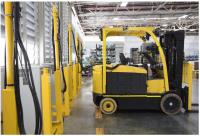 Add My Company
Add My Company
Sign In

Lead acid batteries have certainly been around for quite some time, but there are now a few different battery options currently available on the market today.
With the number of electrically powered forklifts ever-increasing in the logistics sector, due to easier handling, lower maintenance, and greater indoor outdoor flexibility – selecting the right battery has become more and more vital, to ensure better operational capability and maximum efficiency.
From high power density, to flexible charging and cost effectiveness, we’ll be taking a quick look at some of the popular battery options currently available for forklift users.
Lead-acid
Most forklift operators working in warehousing or storage applications will already be familiar with lead acid batteries. They are arguably still the most recyclable and economic power source in the sector.
The batteries have a long track record of being robust and reliable, and still remain the main battery of choice in the industry – largely due to them meeting the correct counterbalance for forklifts.
Lead-acid batteries effectively provide the minimum weight required by the forklift truck, and advancements in the technology, such as Thin Plate Pure Lead (TPPL) batteries have allowed lead-acid batteries to keep up with more difficult demands in terms of productivity, charging times and performance in the sector.
TPPL technology has added significant improvements to the traditional lead-acid battery, including increased power capacity and density, as well as eliminating the need for water refilling.
Another plus point for this type of battery is that it can be far less costly than the other notable options available, like the nickel-cadmium and lithium-ion batteries.
Nickel-cadmium
Industrial nickel-cadmium (NiCad) batteries are usually considered the middle option when it comes to powering heavy lifting machinery, like forklifts and trucks.
They can often cost more than lead-acid batteries and contain significantly less energy capacity than lithium-ion options. NiCad doesn’t really cater to either, those looking to save a lot on costs, or those who are looking for the most advanced energy efficiency.
Industrial NiCad’s are much larger than their consumer counterparts, and each cell contains free-flowing, liquid electrolyte. They can be very useful for certain applications that demand very high discharge rates, this is due to the battery being able to effectively perform under these conditions, without suffering damage or loss of capacity.
These batteries are fairly toxic heavy, requiring much greater care and consideration when in use, and especially during the recycling process.
Lithium-ion
Lithium-ion (Li-On) batteries are widely considered to be the technological future in the sector, when it comes to powering industrial machinery and vehicles. In the last few years, the batteries have emerged as the potential successor to the more commonly used lead-acid batteries.
When it comes to energy regulation and storage, they are by far the most superior option on the market at the moment – as they boast a high energy density, storing a lot of energy in a small space, along with an increased discharge rate.
Another reason to choose Li-On batteries is the fact that they require hardly any maintenance, having no need to refill them with water – plus they last far longer than other power options, with a life expectancy of approximately 5 years or more, allowing for greater efficiency and cost-savings. Flexible charging capabilities also make lithium-ion batteries a more advanced power choice.
They are heavily regulated and can contain huge amounts of energy, causing them to be very reactive if handled incorrectly. Requiring the utmost care when transporting, storing or just generally managing them.
Currently there are less options for recycling the batteries at the end of life, due to the technology still being relatively new.
Before making any decisions on the battery technology that’s best for you, it’s always best to fully compare all the relevant information, to help you make the most informed decision.
Whatever you decide, remember it’s essential that you get a reliable charging unit, which is fully compatible, and designed specifically to work with the chosen battery – if unsure, always consult a professional battery supplier.
Are you looking to purchase a new Forklift or used forklift? Why not give us a call today? 0800 298 8790
For more information on SELECTING THE RIGHT BATTERY FOR YOUR FORKLIFT talk to H and F Lift Trucks
Enquire Now
List your company on FindTheNeedle.

